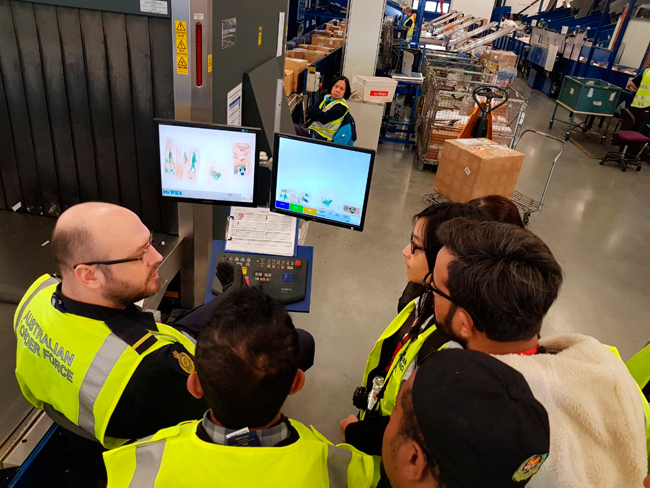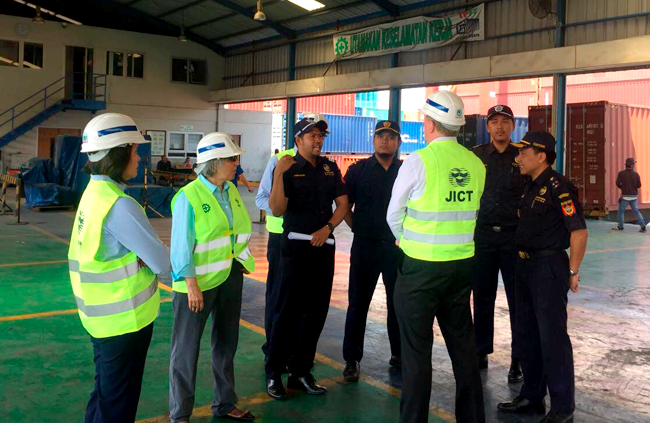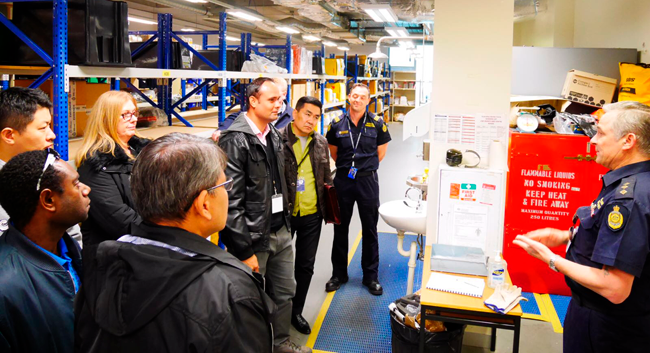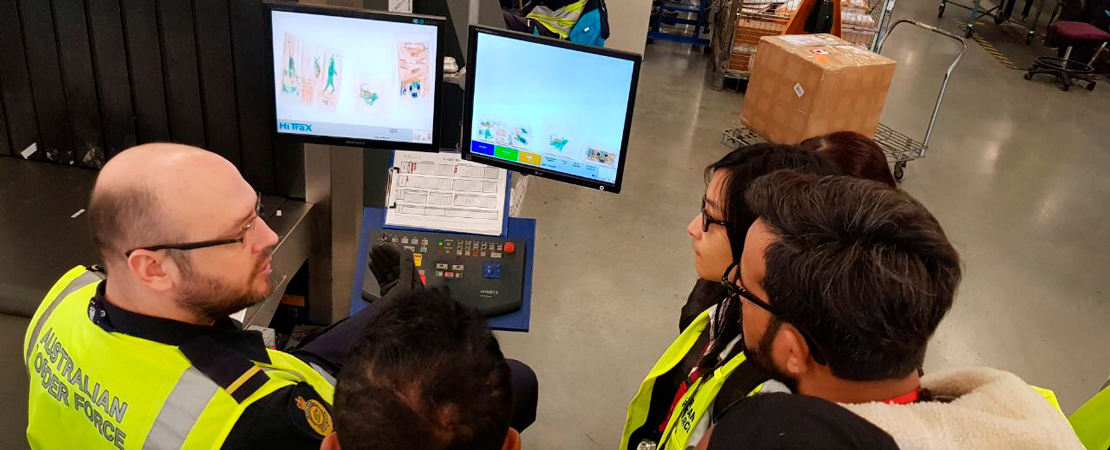WCO Asia Pacific Security Project: activity update
20 June 2018
In light of the spate of terror attacks in various regions around the world, on 10 December 2015, the WCO Policy Commission issued the Punta Cana Resolution, which emphasizes the key role that Customs administrations play in tackling illicit cross-border movements of goods that could ultimately support terrorism and terrorist financing.
The WCO Resolution, which was closely aligned with other international declarations issued by the G20 Group and the United Nations Security Council condemning terrorist attacks, urged Members of the WCO to re-concentrate their efforts to prevent such attacks.
WCO Security Programme in a nutshell
Besides raising awareness among Customs administrations on the issue, the WCO then developed a Security Programme to support those of its Members who needed assistance in building or enhancing their border security capacity. The programme is divided into five streams of work:
- Programme Global Shield (PGS), an initiative to monitor the trade in 14 chemicals that could be diverted for use in the illegal manufacture of improvised explosive devices (IEDs) as well as in the trade of detonators and transmitters;
- the Small Arms and Light Weapons (SALW) Project, which is aimed at countering arms smuggling;
- the utilization of advance passenger information (API) and passenger name record (PNR) data to enhance passenger controls;
- the Strategic Trade Controls Enforcement (STCE) Programme, which aims at building the capacity of Customs administrations in dealing with strategic goods, which are defined as weapons of mass destruction (WMD) and conventional weapons and related items involved in the development, production or use of such weapons and their delivery systems;
- the fight against terrorist financing and illicit trade flows in general.
WCO Asia Pacific Security Project in action
Thanks to financial support from the Government of Japan, a specific project was developed for Customs administrations in South East Asia and the Pacific Islands to strengthen their capacity in three of the five areas of the WCO Security Programme: items monitored under the PGS, SALW, and passenger controls through the use API and PNR.
To manage the project, a dedicated team has been established at the WCO’s Headquarters. Moreover, experts with technical expertise in the three areas of work that the project focuses on were hired. They work from Thailand thanks to the generous support provided by Thai Customs to facilitate the delivery of training in the region.
Awareness-raising
The official project launch event was held in Bangkok, Thailand in March 2017. This was followed by several other events including an “Introductory Workshop on the WCO Security Project” in Jakarta, Indonesia in April 2017, and a “WCO Asia/Pacific Regional Workshop on SALW” in Melbourne, Australia in July 2017.

A further awareness-raising event was held in Bangkok in October 2017 focusing on the threat posed by IEDs in the region, the benefits of PGS, and strengthened passenger controls to mitigate the threat of cross-border movement of foreign terrorist fighters.
Scoping missions
Scoping missions were conducted to determine the needs of Customs administrations in the region. The project team has completed missions to Bangladesh, Cambodia, Indonesia, the Lao People’s Democratic Republic, the Maldives, Myanmar, the Philippines, Thailand and Vietnam in order to further discuss national needs for technical assistance and capacity building, as well as to gain an understanding of country-specific security threats and circumstances.

Training material
The training material already developed as part of PGS was updated and training material on passenger controls has been completed. As for the development of material related to SALW, it is still ongoing with a number of Customs administrations and a range of stakeholders, including INTERPOL and the United Nations Office on Drugs and Crime (UNODC) being consulted.
Capacity building activities
As with other projects, a train-the-trainer approach was adopted to ensure that administrations are equipped with skills and knowledge to conduct their own national training, guaranteeing the sustainability of the project. Train-the-trainer courses gather representative from all participating countries. The first training event took place in March 2018 in the Philippines as part of PGS, where participants deemed to have potential were identified.
These identified officials will have to take part in a capacity building mission with an expert, during which their training skills will be evaluated once more. Participants from Bangladesh have already delivered training on PGS related matters to their peers in Dhaka in April 2018 with the assistance of the project’s PGS expert. A train-the-trainer event on SALW will be held in Cambodia soon.
When it comes to passenger controls, workshops will be organized in the coming months for Customs and other border agencies as well as stakeholders in the region to discuss effective risk assessment and targeting techniques through the use of, among other things, pre-arrival risk assessment based on API and PNR, as well as the dissemination of WCO guidance on building API and PNR systems, and information on other relevant WCO tools and instruments aimed at enhancing risk assessment capacities.
In addition, national workshops focusing more in depth on risk assessment related practices and inspection techniques on air passengers will be held. Each of these events will be customized, according to the needs of each country and to the prevailing situation as regards the level of risk and the type of illicit trade confronting it.

Operational activities and equipment
Organizing enforcement operations is planned in the near future, and coordination groups are to be established to facilitate communication among Customs administrations in the region. An operation targeting products monitored under PGS and another focusing on SALW is scheduled to be held.
To support PGS related operations, the WCO will make its Global Shield Application available – the application is a secure communications platform dedicated to PGS. Moreover, to further enhance the capability of Customs administrations in the region, field officers will be provided with modern portable inspection devices for the detection and identification of explosives and related items, together with training in their use.
The deployment of a standardized API and PNR system in one administration as a pilot test is ongoing. The API-PNR system will collect passenger data and have a number of search, targeting and sorting functionalities designed to identify persons representing a risk from pre-tested standard profiles. It will also compare passenger data collected with data from national or international processing systems concerning people who are known or wanted, and stolen or lost documents.
Developments
In view of the progress achieved as part of the WCO Asia Pacific Security Project, the Government of Japan decided to fund a similar programme for countries in West and Central Africa. This new security initiative was launched in Guinea in April 2018. During the launch, the heads of Customs administrations in the region discussed ways to strengthen border control as a means of enhancing security and safety, and fully welcomed the new project.
To learn more about these initiatives and to discuss what Customs administrations have done to address security threats and what more should be done, three years on from the Punta Cana Resolution, you are invited to attend the WCO Global Security Conference that is scheduled to be held at WCO’s Headquarters in Brussels from 2 to 4 October 2018.
More information
securityproject@wcoomd.org

